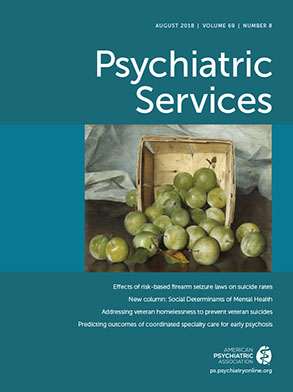The excellent article by Ilana Nossel, M.D., and her colleagues in this issue of Psychiatric Services demonstrates the effectiveness of early intervention—coordinated specialty care (CSC) services—in the first 12 months of intervention. Outcomes for treated individuals who are experiencing an episode of nonaffective psychosis include improvements in general measures of functioning, reductions in hospitalization rates, as well as increased participation in education and employment. This is very good news from a clinical perspective, but what might it tell us about other outcomes of importance to policy makers, such as involvement in acts of violence or joining the rolls of disability programs? From a policy perspective, what does the effectiveness of early intervention mean, and what does it imply?
Mental health policy now encourages early intervention services. The Substance Abuse and Mental Health Services Administration federal block grant to the states has been supplemented with required set-asides for early intervention services, and the 21st Century Cures Act reinforces their importance. Many states have accepted the incentive and are engaged in implementation activities. The recent movement providing resources and creating incentives to implement early intervention has a foundation in research on first-episode psychosis services and efforts to reduce the duration of untreated psychosis. The underlying observation is that shorter duration is associated with better outcomes. The underlying hope is that reducing duration by providing outreach combined with evidence-based treatments will improve those outcomes and bend the curve of disability associated with psychosis.
To accomplish this goal of reducing duration of untreated psychosis and attempting to forestall or prevent disability, the field has tested the implementation and impact of a suite of services now referred to as CSC. An examination of the evidence-based components of CSC (antipsychotic medications, cognitive-behavioral therapy for psychosis, family psychoeducation, and supported employment, among other elements) reveals that these treatment elements were all demonstrated to be effective for already disabled individuals, before they were assessed in the earlier stages of nonaffective psychosis. CSC combines these evidence-based practices into a team-based approach, adding shared decision making and peer supports. The findings of effectiveness in experimental and observational studies for individuals in the early stages of psychosis are promising for the near term and medium term (at five years in some studies). Unfortunately, there is no evidence, yet, that CSC prevents longer-term disability. There can be no doubt, however, that bringing superior outcomes to individuals earlier and earlier in the history of their condition is a clinical and social good on its face. Who can argue with effective treatment over neglect or poor treatment? But are there any downsides if the promises of preventing disability with CSC turn out to be exaggerated?
I am concerned that lawmakers who provided the new resources for CSC implementation have unrealistic expectations for preventing disability. They may expect that early intervention will forestall or prevent individuals from applying for disability cash benefits and related entitlements. Lawmakers also may harbor hopes that early intervention will prevent some of the other untoward occurrences associated with psychotic episodes, no matter how rare, such as episodes of violence. We should remember that the first Congressional support for early intervention services came in the wake of the Sandy Hook school shootings. Previous mental health reforms also promised that early intervention in treatment (in asylums in the 19th century or in community mental health centers in the 20th century) would prevent disability. Those promises were unfulfilled, and those disappointments suggest that we should be modest and more specific in our advocacy. I think that it is important to distinguish between the short-term benefits of bringing CSC to those who need it early in the course of illness from its potential to prevent disability. Policy makers may tire of supporting CSC implementation if the prevention goals are not achieved and disability rolls continue to grow or if an episode of violence once again associates psychosis with killing. Early intervention may imply prevention of disability, but I think it must mean bringing effective treatment to everyone who needs it, as soon as psychotic illness emerges. Treatment must be appropriate and administered for the right length of time. Early intervention, not late intervention and neglect, should be the norm.

